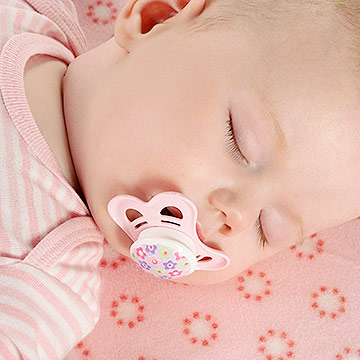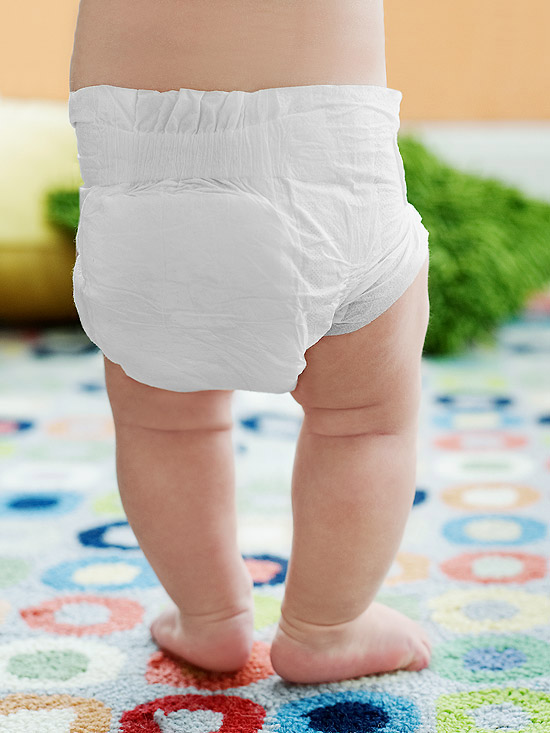
Bath Time & Fever Cures
Bathing Basics
Old Advice: Babies need daily baths.
New Advice: It's not necessary to bathe an infant more than two or three times a week, as long as you wash her face, hands, and bottom in between full baths. If your baby enjoys baths and you choose to bathe her every day, however, use soap only on the face, hands, and bottom. Using soap all over the body will dry out her skin.
Fighting Fever
Old Advice: When infants are feverish, give them baby aspirin and rub them down with alcohol to cool their skin.
New Advice: Never give a baby (or any child under 18) aspirin, because it increases the risk of Reye's syndrome, a potentially fatal disorder that can occur in children recovering from a viral illness. Use acetaminophen or ibuprofen instead. "Alcohol is counterproductive to bringing down a fever because it evaporates on the skin, causing a baby to shiver, which actually generates more heat," Dr. Grunbaum says.

Sleeping
Shhh, The Baby\’s Sleeping
Old Advice: Babies need absolute silence to sleep well.
New Advice: It's good for babies to learn to sleep through the whir of a vacuum cleaner, the sound of the TV, or the chatter of an older sibling. In fact, after nine months in the womb, babies are already conditioned to sleep with background noise, so it may be easier for them to sleep with white noise around them.
Sleeping Safely
Old Advice: Put your infant to bed on her tummy, said doctors, who worried that babies could inhale and choke on mucus or vomit while sleeping on their back.
New Advice: Babies are not more likely to choke when sleeping on their back, but they are at higher risk of SIDS while sleeping on their stomach. Doctors aren't sure why, but they believe that sleeping facedown may place excess pressure on the diaphragm or force babies to rebreathe exhaled air, which is low in oxygen.
Crib Caution
Old Advice: Babies should sleep on pillows and under quilts, just as adults do.
New Advice: The American Academy of Pediatrics advises removing all pillows, blankets, sheepskins, stuffed toys, and loose bedding and bumpers from cribs because they may increase the baby's risk of SIDS.

Feeding
Breast or Bottle
Old Advice: Formula is just as healthy for babies as breast milk. In the '60s, mothers and doctors saw ready-to-use formula as a modern convenience. Pediatricians didn't encourage mothers to breast-feed, because the health advantages hadn't yet been discovered.
New Advice: The AAP strongly advocates breast-feeding because it's now known that the antibodies in breast milk boost a baby's immune system. Extensive research has established the benefits of nursing: It reduces the risk of illnesses, including allergies, asthma, ear infections, diarrhea, bronchitis, pneumonia, Crohn's disease, juvenile diabetes, and childhood lymphomas.
Feeding Time
Old Advice: Babies should be put on a strict four-hour feeding schedule as soon as they leave the hospital. If you feed them whenever they seem hungry, you might spoil them or increase their risk of intestinal infections.
New Advice: Most doctors advise against imposing a feeding schedule on infants. "For the first three months, follow the baby's lead and feed on demand," says Parents adviser Katherine Karlsrud, M.D., an assistant clinical instructor in pediatrics at Weill Medical College of Cornell University, in New York City. "If you have a newborn who fusses for a snack every hour, you can try to extend the time between feedings gradually as long as your baby is gaining weight." By the time he's 4 months old, he'll probably have established his own schedule.
Solid Suggestions
Old Advice: Start giving your baby some cereal at about 6 weeks to help her sleep through the night.
New Advice: There's no evidence that babies sleep better with a fuller belly, but studies have shown that those who start solid food too early may be more likely to develop food allergies, says Laura Grunbaum, M.D., of Bancroft Pediatrics, in San Leandro, California. Pediatricians now recommend starting solids between 4 and 6 months and introducing one food at a time.

Pigeon Toes & Dancing Feet
Lap Dancing
Old Advice: Don't let infants stand and bounce on your lap — the activity may bend or bow their legs.
New Advice: Babies' legs are quite resilient. In fact, doctors often encourage assisted standing to strengthen your baby's legs, as long as he seems comfortable.
Treating Pigeon Toes
Old Advice: Corrective shoes, leg braces, or splints are needed to treat turned-in toes.
New Advice: It's perfectly normal for babies to have pigeon toes, because they've spent months cramped in the womb. In most cases, feet turn out on their own by the time children are 3 or 4.
Walking
Fancy Footwear
Old Advice: Babies' first shoes should be hard-soled and cover the ankle. Infants need firm support to keep their feet properly aligned.
New Advice: Flexible shoes with nonskid soles are best for babies. However, doctors also recommend keeping infants barefoot as much as possible while they're learning to walk indoors. "I tell my patients that there are three reasons to put shoes on babies: to protect their feet when they're walking outdoors, to keep their feet warm, and to make them look pretty," says Lane France, M.D., of the Pediatric Health Care Alliance, in Tampa, who has been in practice for 28 years.
Walk and Roll
Old Advice: Baby walkers are wonderful — they help babies learn to walk.
New Advice: Mobile walkers actually hinder walking because they allow a baby to move around too easily. More important, they pose a major risk of injury — even death — from rolling down stairs or tipping over. After 1997, safety standards required new walkers to be too wide to fit through most doorways and to stop at the edge of a step. But these improved models can't prevent all injuries. "Stationary walkers, which have no wheels but have seats that rotate and bounce, allow a baby to practice supporting his weight on his legs without the safety hazards of moving walkers," says Richard L. Saphir, M.D., a clinical professor of pediatrics at Mount Sinai School of Medicine, in New York City.
Parents Magazine




